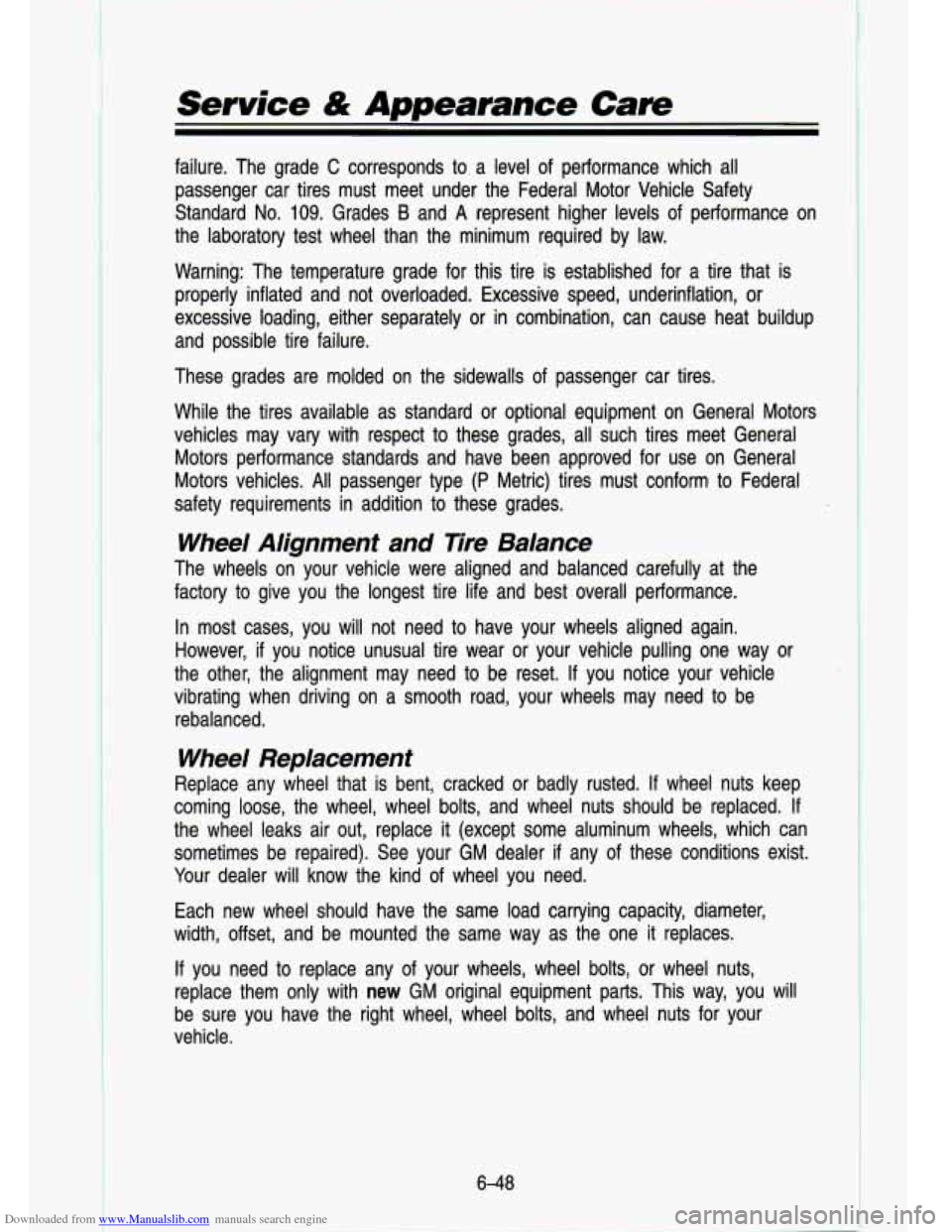Page 216 of 356

Downloaded from www.Manualslib.com manuals search engine Your Driving and the Road
2. Let up on the brake pedal.
3. Drive slowly until the trailer is clear of the chocks.
4. Stop and have someone pick up and store the chocks.
Maintenance When Trailer Towing
Your vehicle will need service more often when you’re pulling a \
trailer. See
the Maintenance Schedule for more on this. Things that are esp\
ecially important in trailer operation are automatic transmission fluid (don’t ove\
rfill),
engine oil, axle lubricant, belt, cooling system, and brake adj\
ustment. Each of
these is covered in this manual, and the Index will help you find them
quickly.
If you’re trailering, it’s a good idea to review these sections before
you start your trip.
Check periodically to see that all hitch nuts and bolts are tight.
Trailer Light Wiring
See “Trailer Wiring Harness” in the Index.
Power Winches
If you wish to use a power winch on your vehicle, only use it when your
vehicle is stationary or anchored.
NOTICE
Use the regular brakes, set the parking brake Or UIWK ihe wheels IW keep
your vehicle from rolling.
4-62
Page 241 of 356
Downloaded from www.Manualslib.com manuals search engine I
CAUT'oN
I A Rust or dirt on the wheel, or on the parts to which it is fastened,
4 can make the wheel nub become loose after a time. The wheel
could come off and cause an accident. When you change a wheel,
remove any rust or dirt from the places where the wheel attaches to
the vehicle.
In an emergency, you can use a doth or a paper towel
to
do this; but be sure to use a scraper or wire brush later, if you
need to, to get all the rust or dirt off.
KO754
Remove any rust or dirt from the wheel bolts, mounting surface\
s or spare
wheel. Place the spare on the wheel mounting surface.
I Never use oil or grease on studs or nuts. If you do, the nuts might
L come loose. Your wheel could fall off, causing a serious accident.
Page 296 of 356

Downloaded from www.Manualslib.com manuals search engine Service & Appearance Care
failure. The grade C corresponds to a level of performance which all
passenger car tires must meet under the Federal Motor Vehicle \
Safety
Standard
No. 109. Grades B and A represent higher levels of performance on
the laboratory test wheel than the minimum required by law.
Warning: The temperature grade for this tire is established for\
a tire that is
properly inflated and not overloaded. Excessive speed, underinfla\
tion, or
excessive loading, either separately or in combination, can cause heat buildup
and possible tire failure.
These grades are molded on the sidewalls of passenger car tire\
s.
While the tires available as standard or optional equipment on \
General Motors
vehicles may vary with respect
to these grades, all such tires meet General
Motors performance standards and have been approved for use on \
General
Motors vehicles.
All passenger type (P Metric) tires must conform to Federal
safety requirements in addition
to these grades.
Wheel Alignment and Tire Balance
The wheels on your vehicle were aligned and balanced carefully \
ar IT.-
factory to give you the longest tire life and best overall performance.
In most cases, you will not need
to have your wheels aligned again.
However,
if you notice unusual tire wear or your vehicle pulling one way \
or
the other, the alignment may need
to be reset. If you notice your vehicle
vibrating when driving on a smooth road, your wheels may need
to be
rebalanced.
Wheel Replacement
Replace any wheel that is bent, cracked or badly rusted. If wheel nuts keep
coming loose, the wheel, wheel bolts, and wheel nuts should be\
replaced. If
the wheel leaks air out, replace it (except some aluminum wheels, which can
sometimes be repaired). See your GM dealer
if any of these conditions exist.
Your dealer will know the kind of wheel you need.
Each new wheel should have the same load carrying capacity, di\
ameter,
width, offset, and be mounted the same way as the one
it replaces.
If you need to replace any of your wheels, wheel bolts, or wheel nuts,
replace them only with
new GM original equipment parts. This way, you will
be sure you have the right wheel, wheel bolts, and wheel nuts\
for your
vehicle.
6-48
I
Page 297 of 356
Downloaded from www.Manualslib.com manuals search engine -nu I IUlY
1 Using the wrong replacement wheels, wheel bolts, or wheel nuts \
on
A your vehicle can be dangerous. It could affect the braking and
handling of your vehicle, make your tires lose air and make you lose
control. You could have a collision in which you or others could be
injured. Always use the correct wheel, wheel bolts, and wheel \
nuts
for replacement.
NOTICE I
I
A
Putting a used wheel on your vehicle is dangerous. You can’t know
how it’s been used or how many miles it’s been driven.
It could fail
suddenly and cause an accident. If you have to replace
a wheel, use
a new
GM original equipment wheel.
Tire Chains
6-49